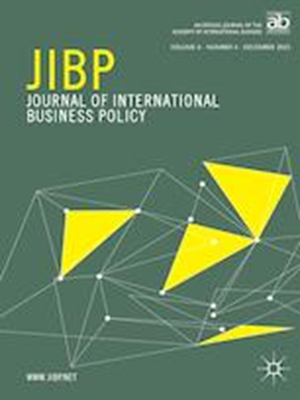弹性和去全球化叙事中的供应链神话:政策后果
IF 4.4
Q1 BUSINESS
引用次数: 1
摘要
COVID-19大流行和俄罗斯入侵乌克兰期间经历的经济中断产生了一种韧性和去全球化的叙事,这使旧世界秩序受到质疑。公众对供应链失灵的高度关注给政府施加了压力,要求它们干预企业层面的运营,以确保必要或战略性商品的供应。本文认为这种叙述建立在错误的前提之上。特别是,公共和学术话语中出现了三个供应链神话:(i)精益管理已经走得太远,加剧了全球供应链的中断;(ii)高效的供应链弹性较弱;(三)外国供应降低了供应链的弹性。我们认为这些信念没有充分的证据支持。它们会取代分析,对政策产生负面影响,实际上会削弱韧性。借鉴IB和供应链管理研究,我们调查了感知市场失灵的根本原因。建议就当前事件和政策进行循证辩论。本文章由计算机程序翻译,如有差异,请以英文原文为准。
Supply chain myths in the resilience and deglobalization narrative: consequences for policy
Abstract The economic disruptions experienced during the COVID-19 pandemic and Russia’s invasion of Ukraine have generated a narrative of resilience and deglobalization that brings the old world order into question. Heightened public attention on perceived supply chain failures has exerted pressure on governments to intervene in firm-level operations to assure supply of essential or strategic goods. This paper argues that the narrative is founded on false premises. In particular, three supply chain myths have emerged in public and academic discourse: (i) lean management has gone too far and exacerbated disruptions in global supply chains; (ii) efficient supply chains are less resilient; and (iii) foreign supply makes supply chains less resilient. We argue that these beliefs are not adequately supported by evidence. They can displace analysis to negatively impact policy and actually diminish resilience. Drawing upon IB and supply chain management research, we investigate the root causes of perceived market failures. Recommendations are for an evidence-based debate on current events and policies.
求助全文
通过发布文献求助,成功后即可免费获取论文全文。
去求助
来源期刊

Journal of International Business Policy
BUSINESS-
CiteScore
10.10
自引率
8.90%
发文量
18
期刊介绍:
The Journal of International Business Policy (JIBP) is a scholarly publication that aims to be the world's leading platform for research on international business policy. It seeks to showcase the best work from scholars in the field of international business and related disciplines. Additionally, the journal provides policy professionals with valuable insights for developing impactful policies.
JIBP is the official publication of the Academy of International Business (AIB), a renowned community of scholars in international business. The journal holds a prestigious status and is currently abstracted and indexed in various databases and platforms, including CNKI, Dimensions, EBSCO Discovery Service, Emerging Sources Citation Index, Google Scholar, Institute of Scientific and Technical Information of China, Naver, Norwegian Register for Scientific Journals and Series, OCLC WorldCat Discovery Service, ProQuest-ExLibris Primo, ProQuest-ExLibris Summon, Research Papers in Economics (RePEc), SCOPUS, and TD Net Discovery Service.
 求助内容:
求助内容: 应助结果提醒方式:
应助结果提醒方式:


